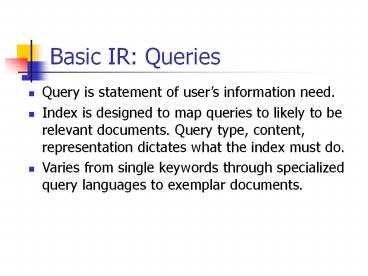Basic IR: Queries - PowerPoint PPT Presentation
Title:
Basic IR: Queries
Description:
... easy to lead astray (e.g., words with multiple meanings), difficult to express ... Just as single word usage is skewed (Zipf's Law) so is query submission on WWW. ... – PowerPoint PPT presentation
Number of Views:78
Avg rating:3.0/5.0
Title: Basic IR: Queries
1
Basic IR Queries
- Query is statement of users information need.
- Index is designed to map queries to likely to be
relevant documents. Query type, content,
representation dictates what the index must do. - Varies from single keywords through specialized
query languages to exemplar documents.
2
Documents as Queries
- Find other documents like this one.
- Query is itself a document it can go through
same sort of pre-processing (e.g., stop word
removal, stemming). - Characteristics of queries mimic those of
documents.
3
Query Term Distribution in SavvySearch
4
Keyword Queries
- Query is composed of a set of keywords.
- Retrieve document that best matches keywords.
- Advantage easy to use, supports fast indexing
- Disadvantage coarse, easy to lead astray (e.g.,
words with multiple meanings), difficult to
express complex information need
5
Boolean Queries
- combine queries (keywords) with Boolean
operators - OR children OR kids
- AND windows AND software
- BUT unix BUT solaris
- no NOT!
- Advantage more precise queries
- Disadvantage does not support ranking, less
intuitive
6
Phrase Search
- Supplement single terms with phrases exact
sequence of terms - Requires index that tracks proximity of terms or
stores both singletons and phrases - Extension is context where proximity between
terms is stated (e.g., adele w/2 howe to
CiteSeer)
7
Query Language Web Search Engines I
- Altavista Advanced Search
- Form
- all of these words
- this exact phrase
- any of these words
- none of these words
- Boolean Expression
- AND
- OR
- AND NOT
- NEAR
- Date, File Type, Location
8
Query Language Web Search Engines II
- Google Advanced Search
- Find Results
- with all of the words
- with the exact phrase
- with at least one of the words
- without the words
- Language, File Format, Date, Occurrences, Domain,
SafeSearch - Page-Specific Search
- Find pages similar to the page
- Find pages that link to the page
- Topic Specific Searches
9
Typical Query Behavior on WWW
- Query term distribution obeys Zipfs Law (quite
skewed, although skew does drift). - Length is ? terms.
- Few users exploit full power of query languages
most enter terms without operations and do not
use advanced search interfaces. - Change in behavior?
10
Natural Language
- Augmented Boolean approach
- Treat query as document.
- Rank documents by how well they match the
constraints of the query and return those above a
certain threshold. - NLP approach
- Interpret semantics in a limited way to constrain
query (e.g., who indicates a person)
11
NL Example AskJeeves
12
Advanced Querying
- Pattern Matching
- combinations of syntactic features, e.g., regular
expressions, wild-card queries - Structural Queries
- forms, hypertext and hierarchies
- typically supports iterative querying as in
guided browsing (e.g., WebGlimpse or Letitzia)
13
Advanced Querying Letizia
- Recommends new pages based on users browsing
preferences - Infers interests by observing user behavior save
bookmark, follow link, spend time on page - Models documents as list of keywords
Figure from http//lieber.www.media.mit.edu/people
/lieber/Liebrary/Letizia/Letizia.html
14
Caching
- An astonishing number of people submit the same
queries (e.g., Harry Potter). - Just as single word usage is skewed (Zipfs Law)
so is query submission on WWW. - Can exploit this by caching results for oft
repeated queries.
15
Single vs. On-Going Queries Filtering
- Find new documents from information stream that
satisfy a static information need - User profile represents interests threshold
represents how closely documents must match. - User may provide the query or it may be learned
through relevance feedback.
16
Filtering Process
from MIR text































